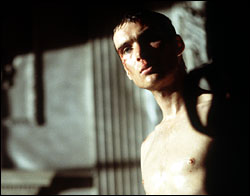A BUNCH OF LAB monkeys infected with “rage” begin to munch on the animal-rights activists trying to save them, and a month later you can’t step out for tea in England without somebody trying to eat you. Such are the ways of Danny Boyle’s 28 Days Later (which opens Friday, June 27 at Metro and others), a horror film so confidently harrowing that you’ll forget he ever made the groaners A Life Less Ordinary and The Beach and think of this as the natural follow-up to the unpleasant pleasures of his Shallow Grave and Trainspotting. A smart cross between the living-dead oeuvre of George Romero and the apocalyptic Charlton- Heston-against-nuclear-mutants flick The Omega Man, Days is the thinking man’s zombie movie.
Ignorant of the aforementioned chimp disaster, Jim (a compassionately heroic Cillian Murphy) wakes up in the hospital after an unrelated accident and discovers a London absent all signs of life. In chillingly empty digital-video shots outstripping even the vacant Times Square of Vanilla Sky, he roams the abandoned streets in a daze, passing graffiti that reads, “REPENTTHE END IS EXTREMELY FUCKING NIGH.” No kidding: Jim soon wanders into a hungry population that’s been transformed by a virus that zombifies within seconds of blood contact. He’s rescued by thick-skinned Selena (Naomie Harris), one of a small group of known survivors, but finds avoiding infection to be the least of his worries.
What lifts Days to a genre peak is its savage ability to be conscientiously terrifying. There is gore here and a white-knuckle intensity (unlike Romero’s lurching stiffs, these zombies give real chase). But the monsters aren’t really undeadthey’re inhuman, the metaphorical implications of which the film riffs on in visceral, discomforting ways. Though the virus is horrific, Boyle and screenwriter Alex Garland (who wrote the novel The Beach and somehow forgave Boyle’s tepid movie adaptation) make clear that the resulting loss of humanity is what should frighten us the most. And that condition isn’t the sole property of zombies: A desensitized Selena hacks up the mutant citizenry with brutal efficiency; and just wait until you meet the supposedly saving grace that is the armed forces (led by Shallow Grave‘s Christopher Eccleston with sociopathic flair).
The survivors here do suffer from the stupid behavior endemic to fright flicks. (I don’t know about you, but I’d tend to shy away from dark highway tunnels after my first encounter with flesh-eaters.) Yet cinematographer Anthony Dod Mantle’s supple DV work gives the film an immediate veracity that lets you shrug off most of its implausibilities.
More importantly, you care what happens to the heroes. By the time Jim and Selena form an odd sort of family with young survivor Hannah (Megan Burns) and her father, Frank (a nice turn by Brendan Gleeson of The General), the idea of these people coming to any harm is a source of great dread. In times of infectious, paralyzing horror, Boyle gives real resonance to the necessity of protecting what’s most decent inside our blood.








